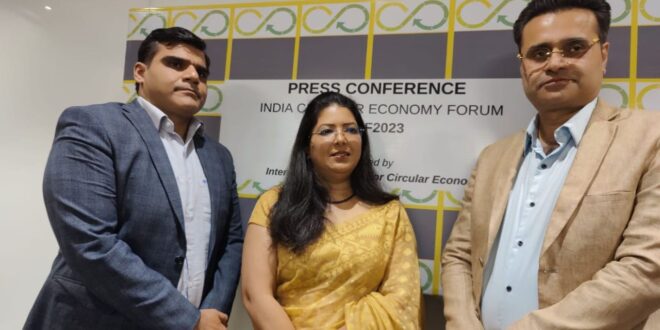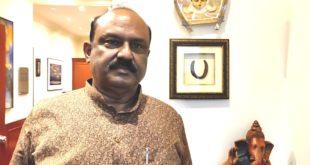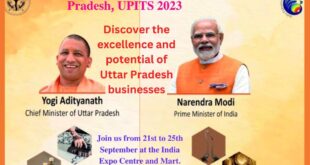By: Surveshwar Sarvesh
15 June, 2023 in New Delhi: A press conference was held by the International Council for Circular Economy to announce the second Indian Circular Economy Forum (ICEF2023), which was supported by MEITY, and to discuss the results of the Helsinki roundtable on the “Role of the global South in enabling a global circular transition.” The India Habitat Centre in New Delhi will host the two-day India Circular Economy Forum ICEF2023, which will begin on June 29.
The International Council for Circular Economy’s flagship event, ICEF2023, will feature prominent speakers such as Shri B.V.R. Subrahmanyam, CEO of NITI Aayog, Mr. Amitabh Kant, and professionals from the Asian Development Bank, IFC, SITRA, WBCSD, World Bank, 2Impact, Coca-Cola, and numerous other organizations.
Business leaders, policymakers, and experts from India and around the world attend the annual India Circular Economy Forum (ICEF) to present India’s leading circular economy solutions. The forum will focus on “Transitioning from throwaway culture” this year. In addition to contributing to the achievement of the Sustainable Development Goals set by the United Nations, circular economic strategies can assist businesses in seizing new opportunities and gaining a competitive advantage.
“ICEF is a chance to find, show off, and celebrate circular initiatives in various focus sectors across India.” By providing a platform for stakeholders to share insights, network, and learn from other practitioners of the circular economy, the forum features a futuristic approach for building and scaling a circular economy. It motivates leaders to come up with plans to cultivate planet-friendly individuals.
ICEF2023 has already been supported by international organizations like GGGI, 2Impact, the Netherlands, TUV Rheinland, SITRA, ACEN, and WBCSD. At ICEF2023, GIZ, Aditya Birla, Saint Gobain, Microsoft, JSW Cement, Godrej & Boyce, Bisleri, Bosch, TERI, Recykal, Recity, Coca-Cola, Ola, and IPI will represent.
The second edition of the Awards in Circular Economy (ACE) was also announced by Ravinder Dahiya, Executive Director and co-founder of the International Council for Circular Economy. All organizations that take a “circular economy” approach to overall organizational, site, or project-specific resources are eligible for this award. The winning entry for this award in the circular economy will take into account all facets of waste reduction and recycling in addition to “The 5 R’s” (refuse, reduce, reuse, repurpose, and recycle), which include supply chain integration and collaborative working.
“This year ICEF2023 is going to introduce the Accelerator sessions and studios for the first time in India,” stated Shalini Goyal Bhalla, Managing Director of the International Council for the Circular Economy. The pioneers attend studios, which are sessions with relevant stakeholders that are focused on action and will facilitate the ideas, best practices, knowledge, and actions required for a circular transition. Lead organizations can host studios to discuss technological interventions, policy regulations, entrepreneurial journeys, the most recent research, and innovation that enables a transition to a circular economy from various perspectives. Gas pedal meetings are information driven meetings taken by accomplice associations. Knowledge essential to incorporating circularity into product and system design is imparted in these sessions. Sessions on circular design, materiality, circular cities, LCA, and circularity assessments would be held at ICEF2023.
At WCEF2023, ICCE recently hosted a roundtable. The topic of discussion was “Role of the Global South in Enabling a Global Circular Transition,” and it took place on May 31 in Helsinki, Finland. The council was in charge of organizing the roundtable. The roundtable was the first of its kind to be led by the South to support the global transition to a circular economy. There were 44 global leaders in the circular economy who attended the roundtable. The unique combination of cutting-edge technology and traditional wisdom that is assisting the global south in making a significant shift toward circularity was the focus of the discussions.
Together with Mr. Chris Whyte of ACEN and Petar Ostojic of CIEC, Ms. Bhalla presided over the roundtable. Ms. Shalini emphasized the significance of taking collective action and working together to create inclusive pathways to “net neutrality.” If we want to create a truly equitable and inclusive community for a global circular transition, efforts that are rooted in and tailored to the needs of countries in the Global South are urgent, “Ms. Bhalla stated.
The roundtable worked on modeling a futuristic approach to a global circular roadmap and approach to 2050, with active participation from leaders from around the world. Seven organizations signed a cooperation agreement. By providing knowledge and expertise on the circular economy and assistance in the implementation of new solutions on both a pilot scale and an industrial scale, the collaboration will contribute to increased value creation in local and regional business and industry. The parties realize that the activities can enhance one another and strengthen their interactions with one another.
By mapping circular policies, economic incentives, and business models using solutions and best practices, cooperation would help bridge the gap between the Global South and the Global North. It likewise proposes joint preparation with North and South accomplices for a worldwide discourse.
“Almost half of global manufacturing exports originated from the global south,” stated Shalini Goyal Bhalla, managing director of the International Council for the Circular Economy. However, high-income nations have a 13-fold greater material footprint than low-income nations. When devising plans for the transition to circular economies, it is necessary to take into account the startling disparity that exists between the patterns of production and consumption. The roundtable would discuss how the Global South has benefited from traditional practices, digitization, technology, and innovation to overcome linear models.
(189) The India Circular Economy Forum, Second Edition:29-30 June in New Delhi – YouTube
 India's Best magazine for latest Fashion trend , fashion shows, night life , parties , art , entertainment , movies , music , jewellery . fashion trends,mens fashion,fashion magazine,fashion show,fashion designing,fashion dresses,fashion and you,fashion week,fashion designers,fashion design,style,fashion websites,fasion,fashion jewellery,latest fashion trends,what is fashion,new fashion,fashion news,hot fashion,about fashion,fashion for you,fashion models,fashion in india,india fashion
India's Best magazine for latest Fashion trend , fashion shows, night life , parties , art , entertainment , movies , music , jewellery . fashion trends,mens fashion,fashion magazine,fashion show,fashion designing,fashion dresses,fashion and you,fashion week,fashion designers,fashion design,style,fashion websites,fasion,fashion jewellery,latest fashion trends,what is fashion,new fashion,fashion news,hot fashion,about fashion,fashion for you,fashion models,fashion in india,india fashion








